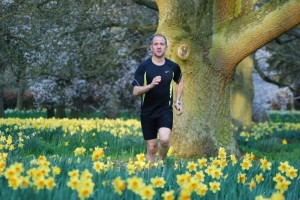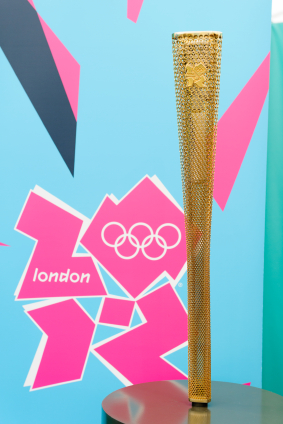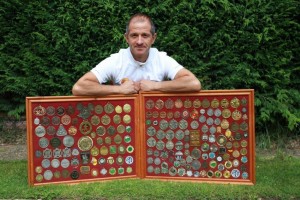Running One Mile with the Olympic Torch is Mark Klenthous’s Dream Come True: the half-British half-Greek talks to The Bridge Magazine in an exclusive interview.
28 June 2012
19,839 views
No Comment
Mark Kleanthous won’t let the fact that he wasn’t selected to be one of the UK’s 8,000 Olympic 2012 torchbearers dampen his hopes of fulfilling a dream.
He is also the founding member of the British Triathlon Federation, who competed in the first ever triathlon in the UK.
The Olympic torch symbolises the ancient spirit and continuity of the Olympic Games, passed hand to hand through successive generations, to the present day.
It would seem there could have been no one better to take part in the bearing of this time worn totem than British-Greek triathlon champion, Mark Klenthous.
The 50 something years old, who has taken part in 33 Ironman races and more than 400 triathlons, fast approaching his 30th consecutive triathlon year, has admitted to The Bridge Magazine to being obsessed with the 2012 London Olympics national torch-bearing relay: “I was hopping to carry the flame, even if it would have been just for a mile”.
Mark indeed seems the perfect choice for reselection to take part in the 70-day 8,000 mile torch relay, and in terms of his profile, would have seemed almost destined to do so: not only will he be competing in the Games in a British triathlon – an athletic contest consisting of three sports: swimming, cycling, and long-distance running; but he is also, as mentioned, of Greek ancestry. Mark has worked in East Londonall his life, and has spent every day trying to encourage others to take up swimming, cycling, running, or triathlon.
But just what is the symbolic meaning behind the Olympic torch and flame?
According to the Urban Dictionary Online:
The Olympic flame is a practice continued from the ancient Olympic Games. In Olympia (Greece), a flame was ignited by the sun and then kept burning until the closing of the Olympic Games. The flame first appeared in the modern Olympics at the 1928 Olympic Games in Amsterdam. The flame itself represents a number of things, including purity and the endeavour for perfection. In 1936, the chairman of the organizing committee for the 1936 Olympic Games, Carl Diem, suggested what is now the modern Olympic Torch relay.
The Olympic flame is lit at the ancient site of Olympia by women wearing ancient-style robes and using a curved mirror and the sun. The Olympic Torch is then passed from runner to runner from the ancient site of Olympia to the Olympic stadium in the hosting city. The flame is then kept alight until the Games have concluded.
The clock is ticking for Mark Kleanthous: there are just a few more weeks to go before the 2012 Games begin, and he is still hopeful though unsure as to whether anyone will have the magnanimity to share the torch-bearing with him.
On June 6, 2012, Mark Kleanthous spoke to The Bridge Magazine
After that disappointment at the age of 10, it is quite amazing that you kept on following your dream. Where does this winning attitude come from? Is it in your genes?
My Father suddenly died aged 51, when I was just 10, so I try and live life to the full with the future uncertain. The “Never Give Up” attitude is because you just never know what lies ahead. So I would like to think that he was looking down and seeing me being active and healthy.
Has the triathlon made you a different person? If so, to what extent?
Yes, from being bullied at school – I am only 165cm – it gave me the confidence in something I was good at.
-
What special values do you think triathlon has given you? How has the triathlon changed your life?
From being shy I have come to meet people from all around the world. I am not afraid to get up and speak to anyone. My extensive triathlon knowledge has given me the ability to stand up in front of 450 people and motivate and encourage them to be the best they can. I have met people of all ages, all lifestyles and backgrounds. Training for triathlon made me every bit more efficient.
-
Your father is Greek. Do you think your passion for sport has its origin in your Greek heritage?
I like to think that back through the generations I had some Greek athletic ancestors.
-
Has anyone in your family ever had a passion for sport, or is your case the exception?
No one in my family has had a sporting history.
-
Do you have a special routine before competitions?
Yes, I must eat rice pudding and finish it three hours before a competition. I keep hydrated, and then drink 330 ml of water 15 minutes before. I talk to myself so as not to get nervous and think about 1 billion Chinese who are not worrying if I fail or succeed. This puts life into perspective for me.
-
How do you handle the pressure?
I think about loved ones who are no longer with us, and those less fortunate Paralympians, and those with terminal illness. L.U.C.K: Labour Under Correct Knowledge: I believe that I am the best prepared I can be under the circumstances. I think of every scenario and learn from my errors. An error made twice is a mistake. I hardly make any mistakes. Doing something wrong twice – I also learn from others’ mistakes even though others seem to replicate their errors time and time again.
-
What are your expectations for the London Olympics 2012?
I was lucky enough to get tickets for the swimming and athletics, so will enjoy every moment. Looking forward to finally seeing Great Britainwin medals, especially at the Triathlon Olympics in Londonmy home town. I hope that Team Great Britain will win more medals than ever before and that each athlete overcomes nerves and excels in their chosen sport. I want to see Great Britain improve the Wow Factor about the UK.
-
What makes you want to go beyond your limits, to keep improving your performances?
I like to test myself to the limits. If I try my best, whatever the result, I consider myself a winner. I base my best performances not on winning (I have won numerous events over the years) but on how I overcome heat, exhaustion, fatigue (mental and physical), dehydration, hypothermia, flat tyres, and mechanical bike breakdown. How I overcome problems makes me a much better and more experienced person.
I have raced for 45 hours in the snow and have finished the Hawaii Ironman in 110 degree heat. I had three punctures in the China Ironman but I didn’t give up. More than 30% of the competitors did not finish that day. I was one of the few who finally crossed that finish line, although, two hours slower than expected. I still have great memories. I know how I kept going during adversity.
-
If you had a chance to start your career again, is there anything you think you would have done differently?
I recently gave up working in London, which is a shame. But I wanted to be involved in the July-August 2012 while the Olympics were happening. I stopped work to finish my book, The Complete book of Triathlon Training, which is now available via my website www.iornmate.co.uk and in all good bookshops, and I now coach, mentor and give nutrition advice to people who want to improve in sport.
Since I have been coaching full time, I have helped people of all ages from 18 to 75, young to professional full time athletes, recreational and retired people, to compete in marathons, triathlons, marathon des Sables (an ultra-distance 125 mile sand race in the Sahara desert), and given advice on living a more healthy life.
-
Do you have a special diet plan you follow to keep fit?
I tend to only eat fresh and frozen foods; I limit tinned foods, apart from baked beans, sweet corn, tuna, and my favourite, rice pudding. I only eat chips two or three times a year, and have hardly any alcohol. Maybe some wine with a meal.
-
What is the worst thing that ever happened to you?
I have finished every triathlon (440+) I have ever started, apart from one where a car knocked me off my bike at a roundabout. I thought I was going to be run over and die!
-
What is your best memory?
Finishing 3rd overall in the very first London triathlon. This was the only time my mother came to watch me in a triathlon. She is now 89 years of age and lives in East London.
-
What is your biggest regret?
That I wasn’t selected to carry the flame. I competed in the first London marathon, but didn’t quite run fast enough to represent Great Britainat running. I turned my energy to triathlon, and then competed in the very first London triathlon, finishing 3rd overall. I also competed in the Race to the Top – and scored the 3rd fastest time up the telecom tower: four minutes 54 seconds. I’ve lived and worked in London for more than 30 years and have represented Great Britain at triathlon. Sadly, it was not an Olympic event, when I was at my best.
My dream was, if I couldn’t represent Great Britain, then I wanted to carry the flame in during the torch relay. I was unable to get the Olympic Games triathlon tickets. I competed in the very first triathlon in the UK and have now crossed the finish line in more than 400 triathlons worldwide, probably more than anyone else in the world so, it would mean so much to me to get a ticket to watch this event at the London 2012 Games.
See you at the races!
Mark, thank you ever so much for taking time to speak to The Bridge Magazine, and we’ ll keep our fingers crossed that your wish will come true.




